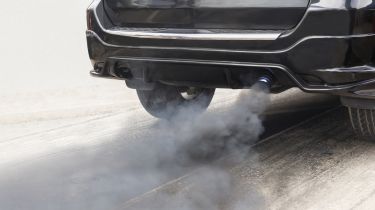Car burning smells explained: Is it the clutch or something else?
Got a whiff of something acrid while driving? We explain the most common causes of car burning smells, and what you should do

It goes without saying that you probably don’t want to smell burning anywhere in or around your vehicle, no more so than you’d like to smell burning in your home. It’s a sign that something, somewhere, isn’t quite operating as intended.
The course of action you should take depends on what exactly has gone wrong, and that’s what our guide is here to help you identify.
Why is my car making a burning smell?
Cars are complex objects, and while modern vehicles are incredibly well developed, they’re not immune from sometimes going wrong. Certain components, when pushed to their limits or when experiencing a fault, can create a burning smell, though the smell can vary depending on what has happened. Sometimes, it could be something simple you’ve done as the driver, but other times, it can indicate an actual problem with the car.
 Smoke from exhaust: what does exhaust smoke mean?
Smoke from exhaust: what does exhaust smoke mean?
Whichever of the following smells you’ve identified, you’ll probably want to take some course of action fairly smartly, be that driving a little more carefully in the case of your brakes or clutch getting too hot, or making a swift exit if something is actually at risk of catching fire.
What could the burning smell be?
There are several potential causes of burning smells in a car. We’d not go as far as saying any of them are good – you’ll want to check out all of them to at least some degree – but some are certainly more serious than others. Below, we’ve covered some of the common culprits, as well as what your course of action should be if you smell any of these things burning.
Brake burning smells
By their very nature brakes generate a lot of friction, and are designed with heat in mind, so the smell of very hot brakes isn’t necessarily a problem.
If you’re an enthusiastic driver you may sometimes notice the smell of brakes if you’ve used them heavily a few times in quick succession. For most drivers, the smell may only become apparent in certain situations – such as shortly after an emergency stop from higher speeds, where the brakes have worked hard to bring your car to a halt. This is more likely to be the case in heavier vehicles such as SUVs, where the braking system is having to contain a lot more momentum – as an extreme example, you’ve probably smelled brakes if you’ve ever followed a heavy goods vehicle down a hill.
In rare cases, after sustained and repeated heavy braking or if part of your braking system is sticking and holding the pads to the discs, you may see wisps of smoke coming from behind the wheels. This is a sign you should stop and let the brakes cool down, and if they’re sticking, you’ll need to take the car to a mechanic sooner rather than later to have the brakes looked at. If you suspect a brake is sticking, touching each alloy wheel carefully after a drive can flag up which one it is. They should be cool to the touch, so one warm alloy wheel is a sure sign of a binding brake at that corner.
Clutch burning smells
Like a car’s brakes, a clutch is a friction device, and that means using it will always generate some heat. However, also like brakes, it’s possible to over-work the clutch to the point it can produce a burning smell.
If this happens just once, there’s no real need to worry. A car’s clutch is pretty robust, and accidentally slipping it too much, for example on a hill start, shouldn’t cause any long-term damage, even if it smells for a few minutes afterwards.
If you smell your clutch burning frequently though, it could indicate two things. One of them is that the clutch may be quite worn, and slipping even under gentle pressure, such as pulling away normally and at relatively low revs on a level surface. If this is the case, it’s probably time to have your clutch replaced, which may also necessitate replacing the flywheel, if the heat has damaged it.
The other thing a frequent burning smell might indicate is something you might not want to hear, which is that you may need to reconsider your driving technique. A clutch will typically last for tens of thousands of miles without needing replacement, but heavily slipping the clutch when pulling away or changing gear, or using too many revs as you engage the clutch, can cause premature wear.
Burning rubber
There are a few situations in which you might smell burning rubber while driving. Most common for enthusiastic drivers is the smell of rubber burning off when deliberately spinning the wheels, though most drivers are unlikely to experience this regularly! In older cars without ABS, you may also smell burning rubber if you lock the tyres when braking hard.
Another possible cause is that one or more of your tyres is underinflated, or has even deflated. When this happens, the tyre is put under a lot of stress from friction and from the rubber deforming, and it can start to create a burning smell. As driving on under-inflated tyres can be dangerous, you should pull over in a safe place and depending on whether the tyre is merely low or fully deflated, either inflate the tyre or replace it with a spare (if your car has one), or call your breakdown service.
 EU introduces new tyre rules potentially saving consumers £5.9 billion a year
EU introduces new tyre rules potentially saving consumers £5.9 billion a year
In rare cases, a burning rubber smell may also be a result of part of your car rubbing against a tyre while it’s in motion – such as a wheel arch liner having drooped down onto the tyre. This is also something you’ll need to get fixed as soon as possible, to avoid damaging your tyres, and whatever part of the car is coming into contact with them.
Electrical and plastic burning smells
We’re grouping these two smells together because they typically go hand in hand – electrical components are generally insulated by plastic or housed within plastic connectors, and the first indication that something electrical is burning is the acrid stench of melting and burning plastic.
The good news is that this plastic usually does a good job of keeping burned-out electrical components from coming into contact with anything flammable. It’s not infallible though, and if you do smell melting plastic, you should stop safely and, if there’s no sign of anything major, investigate. It’s not unknown for a burned fuse or incandescent headlamp bulb to create a brief burning smell, and neither of these is too serious.
But you ideally don’t want to see anything ‘ongoing’ – if you open the bonnet and some wires are still smouldering, then if it’s safe to do so you should disconnect the battery. Electrical problems may compound if they’re close to anything flammable, particularly on older cars where there’s a higher risk of oil leaks and cable routing may not be quite so neat.
Equally, if anything plastic is touching a hot area like an exhaust or turbocharger, it can melt and cause a burning smell – and again, it’s something you’ll need to get sorted as soon as possible. It’s worth checking under the bonnet from time to time, ensuring the sound deadening material lining it is secure and hasn’t come loose or started to sag down onto the engine or other components.
More on car problems
- Causes of an engine management light
- Complete guide to dashboard warning lights
- Reporting a fault on a new car
- Guide to car recalls
- What does smoke from my exhaust mean?
- Car engine noise explained
- Car suspension noise: what does it mean?
- Car windscreen repairs and replacements
- What to do about a noisy car exhaust
Recommended

Classic car tax exemption: which historic vehicles qualify?
Most Popular
Tips & advice

Car dashboard warning lights: what does each symbol mean?

Electric car charging stations: public networks, charger types, apps and maps








